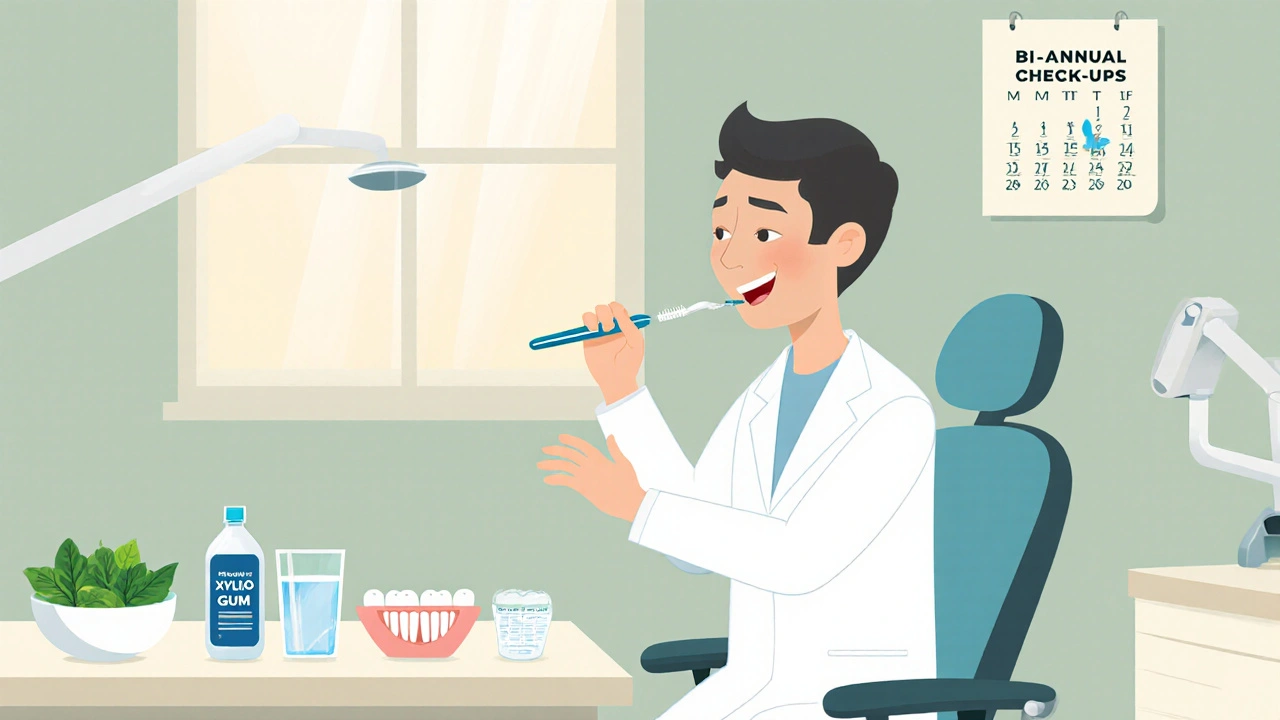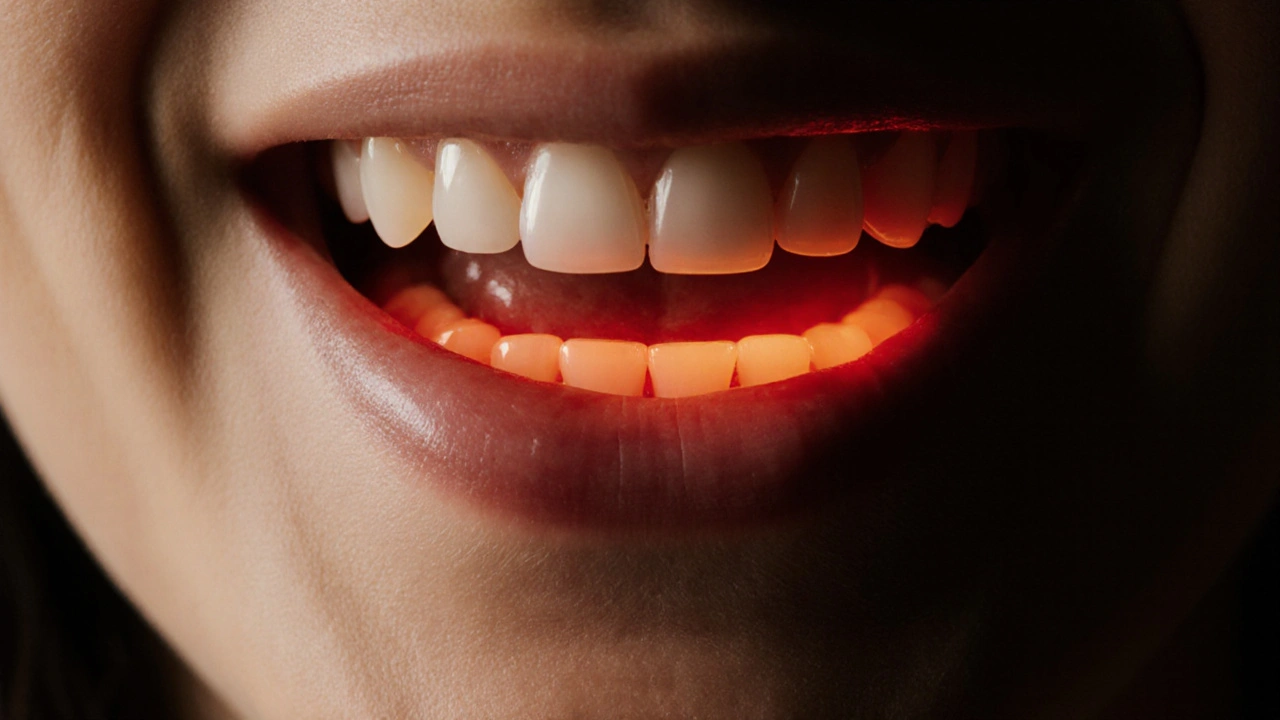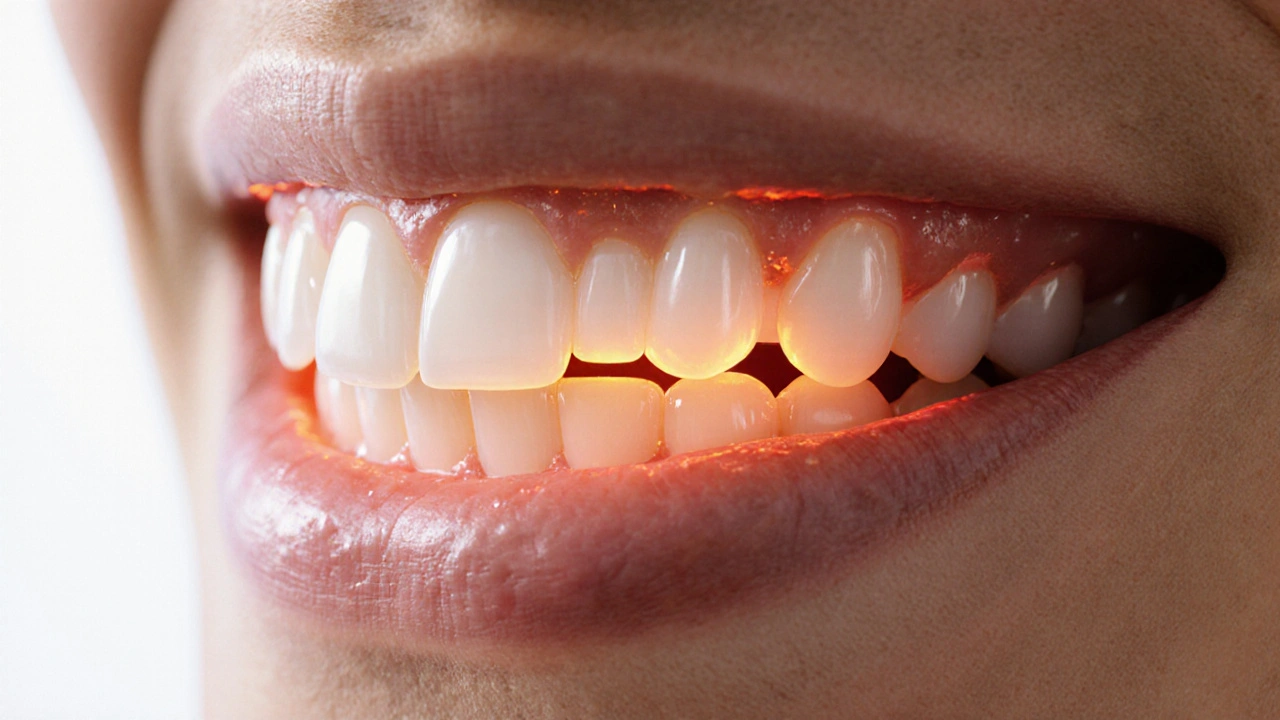Gum Burning Symptom Checker
This tool helps you assess your gum burning symptoms based on clinical guidelines. It does not replace professional diagnosis.
Quick Takeaways
- Burning gums can signal gum disease, vitamin deficiency, medication side‑effects, or stress‑related conditions.
- Good oral hygiene, a balanced diet, and regular dental checks solve most cases.
- Persistent or worsening pain warrants a dental professional’s assessment.
- Identify triggers - spicy foods, tobacco, alcohol - and adjust habits.
- Know the red‑flag symptoms that may indicate deeper health issues.
When the gums feel like they’re on fire, it’s more than just an annoying tingle. The heat can range from a mild prick to a full‑blown sting that makes eating or speaking uncomfortable. Below we break down why this happens, how to calm it down, and when a dentist should be called.
Burning Sensation in the Gums is a sharp, hot feeling that appears on the gum tissue, often without an obvious wound or infection. It can affect one spot or the entire gum line and may come and go or stay constant.
What’s Really Behind the Heat?
Several conditions light up the same symptom. Understanding each helps you choose the right fix.
- Gingivitis is the earliest stage of gum disease, marked by inflammation, redness, and occasional burning when plaque builds up.
- Periodontitis pushes the infection deeper, causing gum recession, bone loss, and a lingering heat that may radiate to the cheek.
- Burning Mouth Syndrome (BMS) is a chronic disorder where the entire mouth, including gums, feels hot or numb without visible signs.
- Oral Ulcers (canker sores) can irritate surrounding gum tissue, making it feel like it’s burning.
- Vitamin Deficiencies, especially B‑complex (B12, folic acid) and iron, reduce tissue health and can trigger a burning feeling.
- Diabetes impairs blood flow and nerve function, often making gums hypersensitive.
- Medication Side‑Effects (e.g., antihypertensives, antidepressants) sometimes alter saliva composition, leading to dry mouth and a burning gum sensation.
- Tobacco & Alcohol irritate the mucosa, degrade protective layers, and heighten the perception of heat.
- Stress & Anxiety can cause muscle tension and change salivary flow, both of which can manifest as gum burning.
How to Spot the Real Cause - A Quick Checklist
- Check for visible plaque, redness, or swelling - likely gingivitis or periodontitis.
- Look for small round sores on the inner cheek or gums - oral ulcers.
- Ask yourself about recent diet changes or new supplements - vitamin deficiency.
- Review any new prescriptions or over‑the‑counter meds - medication side‑effects.
- Consider chronic conditions like diabetes or hormonal shifts - systemic cause.
- Notice if the feeling worsens after coffee, spicy food, or smoking - lifestyle trigger.
Immediate Relief Strategies
Even before you know the exact cause, these steps can calm the burning:
- Rinse with a warm salt solution. Mix half a teaspoon of salt in a cup of warm water and swish for 30 seconds, twice a day.
- Switch to a soft‑bristled toothbrush and gentle fluoride toothpaste; avoid aggressive scrubbing.
- Stay hydrated. Dry mouth amplifies heat, so sip water throughout the day.
- Chew sugar‑free gum containing xylitol - it boosts saliva flow and coats the gums.
- If you smoke, cut back or quit; nicotine is a major irritant.
- Limit acidic or spicy foods for a week and see if the sensation eases.

When Home Care Isn’t Enough - Professional Help
Schedule a dental visit if you notice any of these signs:
- Bleeding that won’t stop after brushing.
- Persistent swelling, pus, or a foul taste.
- Jaw pain, loose teeth, or clicking sounds.
- Burning that lasts more than two weeks despite home measures.
- Accompanying symptoms like unexplained weight loss, fatigue, or frequent urination (possible diabetes flag).
A dentist will likely run a periodontal chart, take X‑rays, and may order blood tests to rule out systemic issues.
Comparing Common Causes and Their Core Treatments
| Cause | Typical Signs | First‑line Treatment | When to See a Professional |
|---|---|---|---|
| Gingivitis | Red, swollen gums; mild bleeding | Improved brushing, flossing, antimicrobial mouthwash | Bleeding persists > 7 days or worsening pain |
| Periodontitis | Gum recession, deep pockets, bad breath | Scaling & root planing, possibly antibiotics | Visible bone loss on X‑ray or loose teeth |
| Burning Mouth Syndrome | Continuous burning, altered taste, no visible lesions | Saliva substitutes, low‑dose clonazepam, stress management | Symptoms > 3 months or interfere with eating |
| Vitamin Deficiency | Glossy tongue, fatigue, pale gums | Targeted supplements (B12, folic acid, iron) | Blood test shows low levels despite supplementation |
| Medication Side‑Effect | Dry mouth, altered taste shortly after starting drug | Switch drug, increase hydration, saliva stimulants | Burning persists after drug change or dosage adjustment |

Prevention - Keep Your Gums Cool Year‑Round
Prevention is easier than treatment. Adopt these habits and the burning feeling will likely stay a rare guest.
- Brush twice daily with a soft bristle brush; replace every three months.
- Floss daily to remove hidden plaque between teeth.
- Visit your dentist for a check‑up and professional cleaning at least twice a year.
- Eat a balanced diet rich in leafy greens, lean protein, and whole grains to supply B‑vitamins and iron.
- Manage stress through short walks, meditation, or breathing exercises; calmer nerves mean calmer gums.
- Limit coffee, alcohol, and sugary snacks that dry out oral tissues.
Mini‑FAQ
Can a simple mouthwash cure burning gums?
Mouthwash can reduce bacteria and soothe mild irritation, but it won’t fix underlying issues like vitamin deficiency or gum disease. Use it as a supplement, not a cure.
Is burning mouth syndrome related to menopause?
Yes. Hormonal fluctuations during menopause can affect saliva composition and nerve sensitivity, often triggering BMS symptoms, including gum burning.
Do spicy foods make the sensation worse?
Spices can aggravate inflamed tissue, so they may intensify the burning feeling. Cutting back temporarily helps you gauge whether irritation is food‑related.
Can dehydration cause burning gums?
Yes. Low saliva levels leave the gums dry and more sensitive, often leading to a hot, tingly sensation.
When should I ask my doctor instead of my dentist?
If you suspect a systemic cause-like diabetes, thyroid issues, or a medication side‑effect-your primary care doctor should run blood tests and review your overall health.
Bottom line: a burning gum feeling is a signal, not a mystery. By spotting the clues, tweaking daily habits, and getting professional input when needed, you can put the fire out and keep your smile comfortable.


Comments (12)
Meg Mackenzie
Sometimes it feels like the dental industry is hiding something behind that soothing smile they advertise, and the burning gums could be a warning sign they don't want you to notice. They push mouthwash like a miracle cure, but it might just be a cover‑up for undisclosed chemicals. Keep your eyes open and listen to what your mouth is screaming.
Shivaraj Karigoudar
Dear fellow seekers of oral health wisdom, let me walk you through the multifaceted etiology of gingival burning with a holistic lens.
First, the microbiome dysbiosis-an imbalance of anaerobic and facultative organisms-can precipitate inflammatory cascades that sensitize nociceptors.
Second, the systemic nutrient insufficiency, particularly of cobalamin (B12) and folate, impairs epithelial regeneration, resulting in hyper‑sensitive mucosal surfaces.
Third, iatrogenic factors such as antihypertensive ACE inhibitors or anticholinergic agents could induce xerostomia, a condition that indirectly fuels burning sensations.
Moreover, cultural dietary patterns, like excessive consumption of piquant chilies in South Asian cuisine, can exacerbate mucosal irritation due to capsaicin over‑exposure.
From a psychosomatic perspective, chronic stress triggers cortisol‑mediated vasoconstriction, which reduces gingival perfusion and heightens pain perception.
In practice, a multidisciplinary assessment-incorporating periodontology, nutrition, and even endocrinology-yields the most comprehensive management plan.
Clinicians often recommend a saline‑based mouth rinse, but remember that hypertonic solutions may paradoxically draw fluid out of the epithelium, worsening the feel of heat.
A gentle, silicone‑bristle brush paired with a fluoride‑free toothpaste can mitigate mechanical trauma while maintaining plaque control.
Supplementation of methylcobalamin at 1,000 µg daily has shown efficacy in pilot studies for neuropathic oral pain, though peer‑reviewed evidence is still evolving.
For patients on polypharmacy, a medication reconciliation is paramount; sometimes swapping an SSRI for an alternative antidepressant can alleviate xerostomic side‑effects.
Additionally, mindfulness‑based stress reduction (MBSR) protocols have demonstrated a 20% reduction in self‑reported burning scores in small cohorts.
It is also worthwhile to screen for systemic conditions like diabetes mellitus, as hyperglycemia compromises vascular health in the gingiva.
If lesions persist beyond six weeks despite conservative management, a biopsy to rule out oral lichen planus or early malignancy is prudent.
Lastly, encourage patients to maintain adequate hydration-at least eight glasses of water per day-to support salivary flow and mucosal lubrication.
Remember, the oral cavity is a mirror of overall health; treating the burning gums in isolation without addressing the root causes is like patching a pothole without fixing the road beneath.
Matt Miller
The burning can often be traced back to simple dryness, so staying hydrated and using a soft brush helps.
Fabio Max
Great points! Keeping a balanced diet and regular dental check‑ups usually puts the fire out.
Darrell Wardsteele
Honestly, the gum issue is not some foreign conspiracy, it’s just basic hygiene that many Americans ignore. You need to brush correctly, floss daily and stop using that sugary soda. It’s simple and every patriotic citizen should do it.
Madeline Leech
Look, if you think you can just ignore the red‑flag signs, you’re wrong – this is about protecting our health and our nation’s future. Bad gums affect productivity, and we can’t afford that.
Barry White Jr
Stay consistent with brushing and flossing you’ll feel better fast
Andrea Rivarola
I often find myself reflecting on how something as seemingly trivial as a burning sensation in the gums can actually signal a deeper imbalance in our lives. When the mucosa whispers of discomfort, it sometimes mirrors the stress we carry in our minds, unnoticed until it surfaces in physical form. The interplay between nutrition, oral flora, and emotional wellbeing is intricate, and acknowledging that complexity can be empowering. I’ve experimented with saltwater rinses, vitamin B12 supplements, and mindful breathing exercises, and each has offered a small piece of relief. It’s also worth noting that the cultural habit of using harsh mouthwashes can strip away protective mucosal layers, leaving the gums vulnerable to that fiery feeling. In my own journey, I’ve learned to replace aggressive products with gentle, alcohol‑free alternatives and to prioritize hydration, because water is the silent healer we often overlook. While I’m no dentist, sharing these observations feels like contributing to a collective knowledge pool where we all benefit. Ultimately, listening to our bodies, staying curious, and seeking professional guidance when needed creates a balanced approach to oral health.
Tristan Francis
They don’t want you to know that the chemicals in toothpaste could be part of a bigger plan to keep us dependent on the dental industry.
Keelan Walker
Hey everyone 😊, I just wanted to add that caring for your gums is a fantastic way to show love to yourself and to the community 🌍. When you brush gently and choose a soft‑bristled toothbrush, you’re actually reducing inflammation and keeping the fire at bay 🔥. Adding a daily probiotic can help balance the oral microbiome, which many don’t talk about enough 🤓. Also, try sipping herbal teas like chamomile; they’re soothing and can keep your mouth hydrated without the harsh chemicals found in many drinks ☕️. Remember, a little mindfulness while flossing-thinking about each movement-can turn a routine into a calming ritual 🧘♀️. Keep sharing your tips, and let’s keep those gums cool together! 🌿
Heather Wilkinson
Thanks for sharing all these great tips! 🌟 It’s amazing how simple changes like staying hydrated and cutting back on spicy foods can make a huge difference 😃. Keep it up, and let’s keep each other motivated! 💪
Henry Kim
I hear you, and it’s completely understandable to feel uneasy when that burning persists. Taking small steps like rinsing with warm salt water and scheduling a dental visit can provide both relief and peace of mind. Remember you’re not alone in this; many have walked the same path and found comfort.